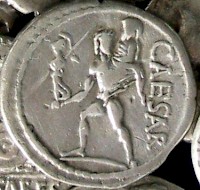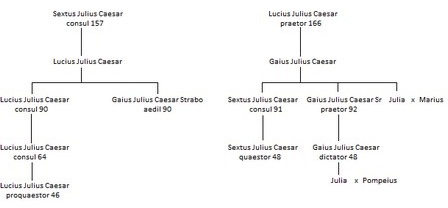Lucius Julius Caesar
Lucius Julius Caesar (c.135-87): Roman politician.

The end of the second century BCE witnessed the rise of new families in Roman politics. The reforms proposed by Tiberius and Gaius Sempronius Gracchus, and the supremacy of general Gaius Marius, had deeply shaken the political world. One of the new families was that of the Julii Caesares. They were not completely new, but their power rapidly increased, which is also indicated by their claim that they descended from the goddess Venus. One of these men was Lucius Julius Caesar. Together with his younger brother Gaius Julius Caesar Strabo, he was among Rome's foremost politicians.
The beginnings of the career of Lucius Julius Caesar are a bit obscure. He was involved in the downfall of the revolutionary tribune Lucius Appuleius Saturninus (in 100) and tried to obtain the quaestorship, but in vain. Yet he was praetor in 94, an office that he cannot have occupied without being quaestor and aedile first. (In the same year, his relative Sextus Julius Caesar was praetor too.) After his praetorship, Lucius Julius Caesar was proconsul (governor) of Macedonia, and during the consulship of his nephew Sextus, he was elected consul too. During his consulship, in 90, his younger brother Gaius was aedile.
 It was to be a difficult year. In 91, when Lucius' relative Sextus Julius Caesar was consul, a tribune named Marcus Livius Drusus had proposed several reform bills, and he had asked support from the Italian allies of Rome. However, he was unable to give them the Roman citizenship he had promised, and was murdered. Immediately, the Italian allies revolted: the beginning of the Social War, which started with many Roman reverses. For example, consul Sextus Julius Caesar lost a battle against the Samnites and died during a siege.
It was to be a difficult year. In 91, when Lucius' relative Sextus Julius Caesar was consul, a tribune named Marcus Livius Drusus had proposed several reform bills, and he had asked support from the Italian allies of Rome. However, he was unable to give them the Roman citizenship he had promised, and was murdered. Immediately, the Italian allies revolted: the beginning of the Social War, which started with many Roman reverses. For example, consul Sextus Julius Caesar lost a battle against the Samnites and died during a siege.
Next year, Lucius Julius Caesar, elected consul, defeated the Samnites. After this success, he proposed the Lex Julia, which offered citizenship to all communities that were not in revolt. This was a way to divide the enemies, and it was highly successful.
In the following year, 89, the Lex Plautia Papiria extended the offer to those who gave up fighting before a certain date. Gradually, the Romans overcame their enemies, although they had made large concessions. Lucius Julius Caesar was now made censor, and responsible for dividing the new citizens in the voting districts. His colleague was another former consul, Publius Licinius Crassus (the father of the triumvir).
At the same time, king Mithridates of Pontus attacked Roman possessions in Asia Minor, which meant war. First, general Sulla was sent to the east, but he was recalled and replaced by his rival Marius. Sulla marched on Rome - the first commander to do so - and restored order. Marius was sent into exile. In this chaotic situation, Lucius' brother Gaius made a bid for the consulship, although he should officially have stood for the praetorship first. This created unrest.
Sulla now left Rome for the Mithridatic War, and in 87, Marius returned and joined forces with Cinna, a former consul who had been expelled from Rome too. They captured the city, and many people were massacred. Lucius and Gaius were killed during the fighting in the streets. According to the historian Livy,note their heads were exposed on the speakers' platform.
Gaius Julius Caesar Strabo was a distant relative of the Gaius Julius Caesar who was father of the famous Julius Caesar.